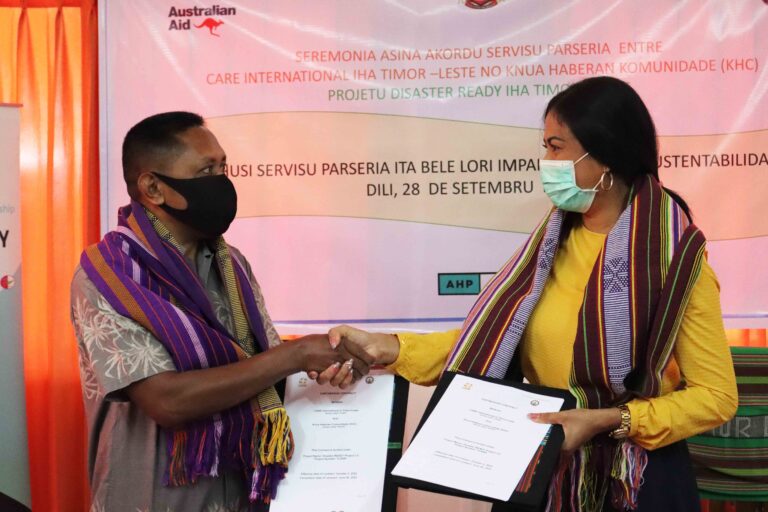CARE and Knua Haberan Comunidade sign a partnership on inclusive disaster risk reduction and climate change adaptation
28 September, 2022

CARE and Knua Haberan Comunidade (KHC) have signed a partnership agreement to ensure that the Disaster READY Project (DRP) activities are inclusively implemented, with a focus on women and people with disabilities, to ensure effective participation in disaster risk reduction (DRR) decision making and climate change adaptation.
The DRP is a key component of the Australian Humanitarian Partnership (AHP) programme, implemented by consortium members consisting of: CARE, Oxfam, Caritas Australia (CAN DO), World Vision, Plan International and the people with disabilities organisation, Ra’es Hadomi Timor Oan. After completing its first phase, the project’s second phase runs for four and a half years, from July 2022 to December 2026, in partnership with the Secretariat of State for Civil Protection, Ministry of Interior.
CARE’s involvement in the project is focused on increasing gender equality and reducing gender-based violence, by ensuring the active participation of women and vulnerable groups, including people with disabilities, in DRR and preparedness efforts. The partnership with KHC is complimentary to CARE’s role in the project as the two organisations have shared values on education, health, agriculture, social justice and gender equality.
The Human Resource Director for CARE (Current Officer in Charge), Yeni Pereira, noted that “Having a local implementing partner under the Disaster READY Project is important to ensure that people are resilient in facing the challenges of disasters, climate change, conflict, and other threats and hazards. Making sure that communities, particularly vulnerable groups, understand that they are the only one who has the power and responsibility to save themselves and to save others is key, and we recognise that KHC is a strong partner for this objective”.
As the Director of KHC, Agosto Pinto, stated, “After the completion of the project, we want communities, particularly women and people with disabilities and other vulnerable groups to have increased capacity to be resilient against disasters in the future. These groups are often left behind in disasters, we want to ensure that they feel valued and are equipped with the necessary disaster knowledge and skills to lessen the impact that they may face”.
The DRP is a key component of the Australian Humanitarian Partnership (AHP) programme, implemented by consortium members consisting of: CARE, Oxfam, Caritas Australia (CAN DO), World Vision, Plan International and the people with disabilities organisation, Ra’es Hadomi Timor Oan. After completing its first phase, the project’s second phase runs for four and a half years, from July 2022 to December 2026, in partnership with the Secretariat of State for Civil Protection, Ministry of Interior.
CARE’s involvement in the project is focused on increasing gender equality and reducing gender-based violence, by ensuring the active participation of women and vulnerable groups, including people with disabilities, in DRR and preparedness efforts. The partnership with KHC is complimentary to CARE’s role in the project as the two organisations have shared values on education, health, agriculture, social justice and gender equality.
The Human Resource Director for CARE (Current Officer in Charge), Yeni Pereira, noted that “Having a local implementing partner under the Disaster READY Project is important to ensure that people are resilient in facing the challenges of disasters, climate change, conflict, and other threats and hazards. Making sure that communities, particularly vulnerable groups, understand that they are the only one who has the power and responsibility to save themselves and to save others is key, and we recognise that KHC is a strong partner for this objective”.
As the Director of KHC, Agosto Pinto, stated, “After the completion of the project, we want communities, particularly women and people with disabilities and other vulnerable groups to have increased capacity to be resilient against disasters in the future. These groups are often left behind in disasters, we want to ensure that they feel valued and are equipped with the necessary disaster knowledge and skills to lessen the impact that they may face”.
